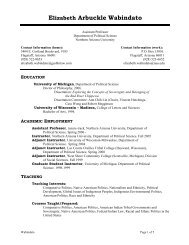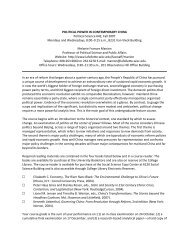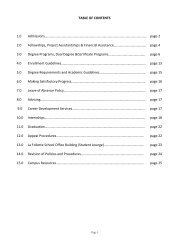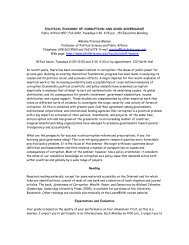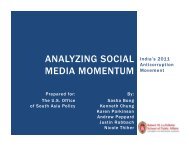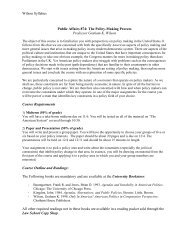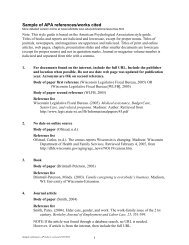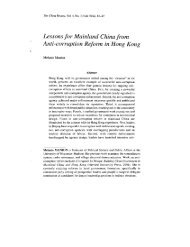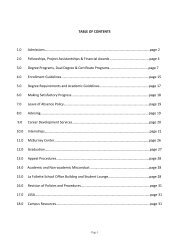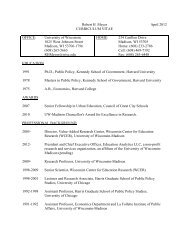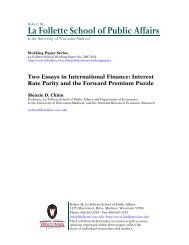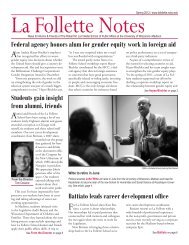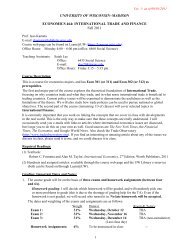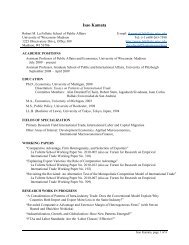SAVE Commission's findings - La Follette School of Public Affairs ...
SAVE Commission's findings - La Follette School of Public Affairs ...
SAVE Commission's findings - La Follette School of Public Affairs ...
Create successful ePaper yourself
Turn your PDF publications into a flip-book with our unique Google optimized e-Paper software.
munity. It sees the library system (see Goals #11<br />
and #12) as a special asset, serving home,<br />
school, business and community. It considers<br />
every citizen’s natural<br />
curiosity as a survival<br />
skill (see Goal #10).<br />
Leading as always, we<br />
have identified ways to<br />
tap existing assets<br />
through concepts such<br />
as youth apprenticeship,<br />
the model K-12<br />
Village Partnership and<br />
distance education. These are seeds <strong>of</strong> ideas and<br />
examples <strong>of</strong> how we can build on the excellence<br />
<strong>of</strong> the past for the challenge <strong>of</strong> the future.<br />
TANGIBLE WISCONSIN IDEAS<br />
1. Develop a knowledge-based economic<br />
strategy. The world will pay for what<br />
Wisconsin knows as well as what it<br />
makes. Wisconsin can adopt a globallydistinctive<br />
strategy to use its knowledge<br />
potential and its University alumni<br />
system as unique assets in an economic<br />
development strategy (see Goal #9).<br />
2. Use knowledge to solve problems we<br />
once asked government to solve. As<br />
part <strong>of</strong> a new citizenship ideal, we will<br />
solve our problems ourselves, using<br />
government as a last resort. We will use<br />
networking and community education<br />
“No reform will succeed without<br />
an idealistic vision. Wisconsin<br />
can yet again serve as a model<br />
for the rest <strong>of</strong> the nation.”<br />
William Cronon, historian, UW-Madison<br />
as tools to breach the barriers <strong>of</strong> pr<strong>of</strong>ession,<br />
bureaucracy, government boundaries<br />
and tradition that prevent us from<br />
seeing each other’s<br />
capacity to be selfsufficient<br />
and driven<br />
to succeed (See<br />
Preamble and Goals<br />
#2, #4, #5 and #20).<br />
3. Use the knowledge<br />
<strong>of</strong> the University,<br />
private colleges<br />
and business to<br />
develop science and technology<br />
policy. Government must tap knowledgeable<br />
players to develop effective<br />
science and technology policy for the<br />
21st Century. Wisconsin can no longer<br />
tolerate political brinksmanship that<br />
leads to regulatory and legal gridlock.<br />
The Governor and Legislature need to<br />
tap the state’s knowledge in a nationally<br />
distinctive way in drafting policies, laws<br />
and programs (see Goals #8, #13, #17<br />
and #18).<br />
The new Wisconsin Idea? It is developing<br />
and using the knowledge capacity and ideas<br />
<strong>of</strong> all Wisconsin people. Together we will come<br />
up with our own ideas that give us noticeably<br />
better citizens, noticeably better communities<br />
and noticeably better government, all moving<br />
Forward for a noticeably better quality <strong>of</strong> life.<br />
Actions<br />
3.1<br />
Link the Department <strong>of</strong><br />
Development and UW<br />
System for economic<br />
development.<br />
3.2<br />
Create a state dialogue<br />
to reinvent citizenship.<br />
3.3<br />
Tap Wisconsin<br />
knowledge to develop<br />
science and technology<br />
policy.<br />
Wisconsin Rural<br />
Development Council<br />
“The Wisconsin Idea<br />
connotes a civic pride,<br />
bringing us together as<br />
a community.”<br />
R E S U L T S<br />
The new Wisconsin Idea<br />
will:<br />
1 Ensure that taxpayer dollars are<br />
invested in knowledge, human<br />
capital and education.<br />
2 Continue Wisconsin’s reputation for<br />
educational excellence beyond the<br />
traditional concept <strong>of</strong> schooling.<br />
3 Enable citizens, businesses,<br />
universities and research centers<br />
to participate as full partners with,<br />
and not as the subjects <strong>of</strong>,<br />
government.<br />
4 Stress that the solution to new<br />
problems might be new<br />
knowledge rather than more laws<br />
or taxes and that solutions come<br />
to government rather than from<br />
government.<br />
5 Improve the economic well-being <strong>of</strong><br />
Wisconsin citizens as well as the<br />
quality <strong>of</strong> life.<br />
6 Enable state employees to draw<br />
ideas from the private and public<br />
sectors to create a government<br />
conducive to education, science and<br />
technological growth.<br />
CITIZEN • COMMUNITY • GOVERNMENT — WISCONSIN: THE 21 ST CENTURY 17



